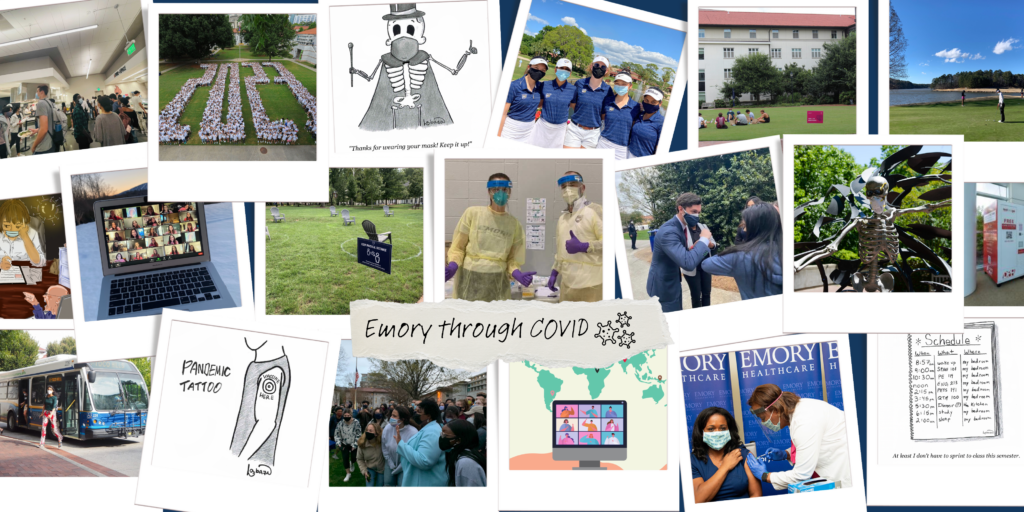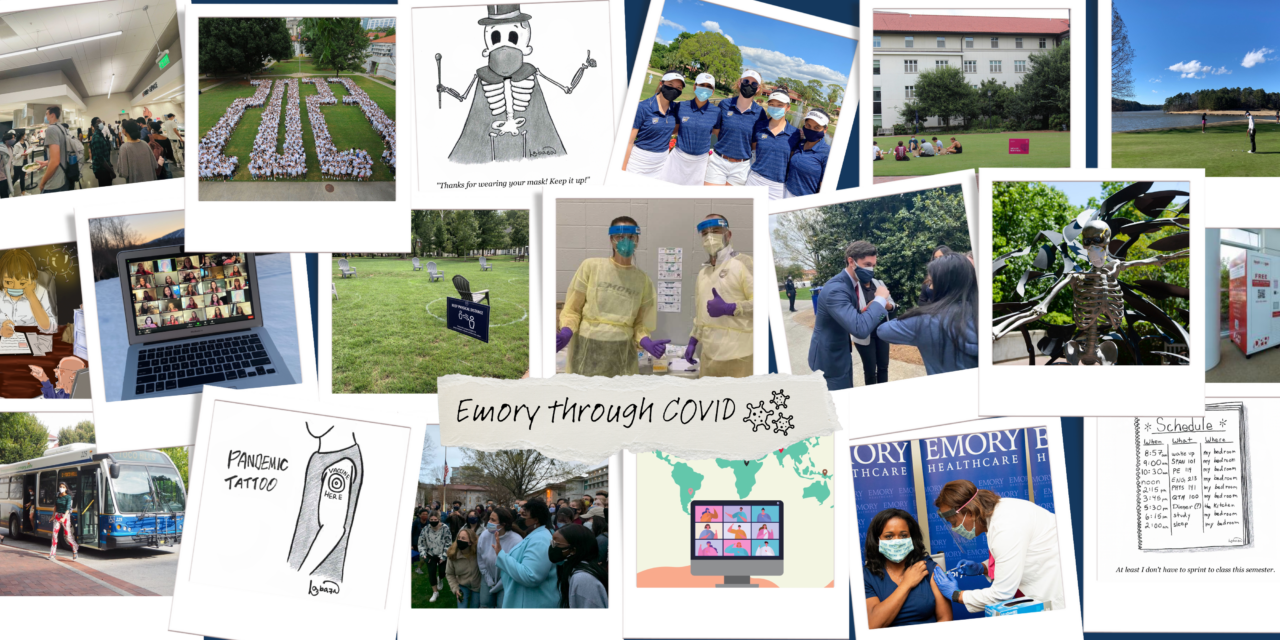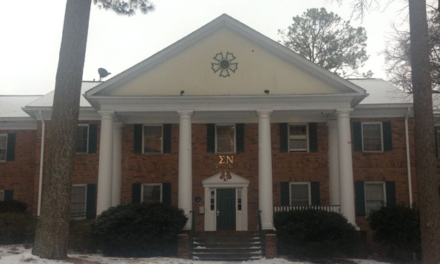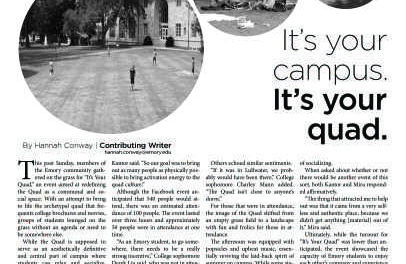When COVID-19 began to make its mark on American soil in March 2020, forcing Emory University to extend spring break, Schuyler Arn (23C) said he felt “awesome.” After dealing with a rough transition into college life, he was relieved to get a break from the academic rat-race that left some students cramming in the library until 4 a.m.
But, 11 days later, spring break ended and virtual classes commenced. The virus continued to spread, and Arn’s excitement for a few days extra off of school melted into “abject despair.”
“It’s still a spectrum a lot of us are running from, certainly,” Arn said, reflecting on the emotions brought on by the pandemic’s three-year anniversary. “It still affects campus community.”
As a member of the Class of 2023, Arn is among the last cohort of students to experience Emory before campus was touched by COVID-19.
Pre-pandemic on campus
Robert Schmad (23C) described arriving on campus as a first-year student like going to summer camp.
“A lot of people, once they get to campus, there’s this almost sense of security, like you are here for the long haul,” Schmad said.
Students flocked to on-campus events and immediately signed up for opportunities from major clubs, like Outdoor Emory excursions and Volunteer Emory Days of Service, according to Clare McCarthy (23C).
But when COVID-19 arrived on campus, Schmad said everything fell apart.
Life in quarantine
Although McCarthy saw headlines about other universities shutting down throughout her Volunteer Emory alternative spring break trip in 2020, she never thought it would happen to Emory.
But, on March 12, 2020, McCarthy huddled around the dinner table with the other students as they stared at their phones, reading the email announcing that Emory was shutting down. Her stomach dropped. She’d had hope when Emory planned to allow students back to campus in the fall. But later, McCarthy said she took it hard when she was hit with the University’s decision to only allow first-year students and other select students on campus the following fall.
“There were a lot of ups and downs,” McCarthy said. “A lot of false hopes and then having that destroyed.”
Students returned to campus to frantically pack, according to Schmad. Within a few days, he found himself standing on the side of the road waiting for an Uber, sweating in his sport coat under the Georgia sun because he didn’t want to wrinkle it in his suitcase.
“I remember just walking out to my dorm hallway and just talking with people and just being like, ‘What the f*** is going on?’” Schmad said. “‘Is the world collapsing?’”
Varsity and intramural sports teams canceled the rest of their seasons. Everything shut down three days before the varsity swim team was set to compete in their national meet, according to varsity swimmer Caroline Maki (23C).
“Grief was the first thing that everyone felt,” Maki said. “Shock and grief that we didn’t get to finish the accumulation of what our season was gonna add up to.”
Meanwhile, University administrators faced the challenge of paving the way forward. As the executive director of the Office of Critical Event Preparedness and Response (CEPAR), Alexander Isakov was a leading figure in establishing Emory’s pandemic response. CEPAR worked with University partners and Emory Healthcare to effectively implement COVID-19 testing, case investigation and contact tracing, quarantine and isolation procedures and vaccine deployment, according to Isakov. The University went on to lead Moderna vaccine trials and develop the antiviral drug Molnupiravir.
Senior Associate Dean for Undergraduate Education Joanne Brzinski said that on some days she would spend 14 hours in front of her computer, on email and Zoom to determine the best way to implement the University’s COVID-19 policies.
When students returned home, they left an “eerie,” quiet campus behind, according to Goodrich C. White Professor of Economics and Department Chair Hashem Dezhbakhsh, who taught virtually from his office. He recalled that one day he was preparing for a lecture when three of his teaching assistants knocked on his door, causing him to jump — he could not fathom someone getting into the building, much less having students in front of him.
“It was quite alarming that I am shocked to see a student on campus,” Dezhbakhsh said. “That’s something that, under normal circumstances, would appear crazy.”

Hayley Powers/Visual Editor
At home, students relied on Zoom to maintain a sense of community. Simran Mallik (23C) commended Emory’s clubs for continuing to engage students, even through laptop screens.
“I’ve always felt that Emory, in terms of their club culture, campus culture, it’s pretty strong in terms of how much there is to do on campus,” Mallik said. “Even though we were online, I felt like that … push to do that was still in people’s heads.”
However, Schmad said that it was difficult to stay socially connected during the pandemic.
“I was kind of robbed because there’s that lack of continuity,” Schmad said. “I was kind of building up friendships … and then they all sort of withered over COVID.”
Department of Psychiatry and Behavioral Sciences Vice Chair and Professor Nadine Kaslow said that isolated online learning festered into exhaustion for some students. Since the start of the pandemic, Kaslow said she has heard the word “burnout” more times in a week than she used to hear in a year.
Kaslow said that students’ mental health was also negatively impacted by the pandemic, especially among students of color, LGBTQ students and students of low socioeconomic class.
“There are legacies of COVID that are not bringing those things down, and you add to that all of the social injustice strains that co-occurred, the economic strains, the war in the world, climate issues,” Kaslow said.
Returning to campus
Schmad was allowed to return to campus early in spring 2021 for research and was greeted with a slew of changes. During this time, most dining halls were solely to-go and students lived without roommates, according to Vice President for Campus Life David Clark. Classes remained online and students hung out in masked groups outdoors. Schmad remembered that students were required to book time slots to use the gym, which he called a “frenzy.” Students were also required to get the COVID-19 vaccine and test regularly.
“Higher education has often been kind of characterized as a slow-moving institution,” Chief Resilience Officer Amir St. Clair said. “The pandemic required us to make really important decisions with ambiguous information in a short amount of time, and it gave institutions like Emory and others confidence that we can do that.”
However, most members of the Class of 2023 did not return to campus until August 2021. McCarthy, who moved back to Emory in spring 2021, said returning to campus that fall was exciting, as she was greeted with the return of in-person extracurriculars and events. For Arn, the return to campus his junior year brought mixed emotions.
“It was definitely scary,” Arn said. “Those first day of school jitters were in full force. A lot of the feeling was just general excitement.”
Varsity athletics returned to practice in spring 2021 and competition the following fall, according to Clark. Maki said the swim team was excited to be back in their home pool and regain a sense of normalcy.
“It was definitely a needed outlet for us to not only exercise and talk with our friends but just keep our mental health up by having something in person to go to,” Maki said.
But the return to campus was met with an increase in COVID-19 cases. Students who reported positive COVID-19 results quarantined in the Emory Conference Center Hotel. Mallik said she got COVID-19 the first week of her senior year, leaving her locked in her apartment with a relentless cough and high fever instead of going to class during syllabus week.
“For me it was not about the work that was hard, it was just how do I know if I’m gonna take this class if I can’t even be there?” Mallik said.
Present-day campus experiences
In 2022, Emory began lifting long-standing COVID-19 policies, such as mask requirements. As of February 2023, members of the Emory community no longer have to get the COVID-19 vaccine or report positive cases.
“During those horrific days, what kept us alive was the hope of returning to the normal,” Dezhbakhsh said. “The hope of seeing the light again, seeing people that we love and we like and being able to socialize with them.”
With the exception of takeout boxes and the occasional mask, Schmad said that Emory seems to be back to its pre-pandemic state. However, McCarthy reported that Emory has still not reached a pre-pandemic level of engagement among students, which she does not pin on a lack of interest, but rather a lack of awareness about the programs.
Similarly, Arn noted that he did not interact over Zoom during lockdown, and the lack of energy and despondency carried over to campus.
“Now that we’re really, at least visually, away from COVID in that sense, it certainly feels like energy’s kind of coming back to campus but I’m surprised it’s taken this long,” Arn said.
As the last class to experience Emory before the pandemic, Arn said the Class of 2023 had the power to bring back traditions that would have otherwise been at risk of dying off, such as the homecoming parade. Similarly, Mallik said that the Class of 2023 is the last cohort of students in her a capella group who had the experience of competing at nationals.
“I want to try to get that generation back to where we were in that sense, but it’s probably just gonna evolve, the culture of the community,” Mallik said. “It won’t be the same exact thing as before.”
Reflecting on her time as the last class to experience Emory before the pandemic, McCarthy said COVID-19 will continue to impact the Emory experience for years to come.
“It’s definitely a unique position and maybe a little bit sad that [younger classes] will never know exactly what Emory was like beforehand,” McCarthy said. “But I am optimistic that lots of good things are ahead and … for Emory to have younger students developing new traditions and perspectives on what Emory should be without being tied down to the past.”
Despite the hardships of the pandemic, Executive Director of Emory Student Health Services Sharon Rabinovitz said that the past three years have given the Class of 2023 the gift of resilience.
“Having that confidence that they have gone through this and can move forward and can still flourish in the context of a pandemic is, in some ways, life changing,” Rabinovitz said. “That opens up your world and your possibilities to anything when you have that self-confidence and self-efficacy that you can get through anything, and the students in the graduating class have proven that. That is a wonderful thing to know at the age of 21, 22.”
Madi Olivier is from Highland Village, Texas, and is majoring in psychology and minoring in rhetoric, writing and information design. Outside of the Wheel, she is involved in psychology research and works for the Trevor Project. In her free time, you can find her trying not to fall while bouldering and watching Criminal Minds with her cat.







